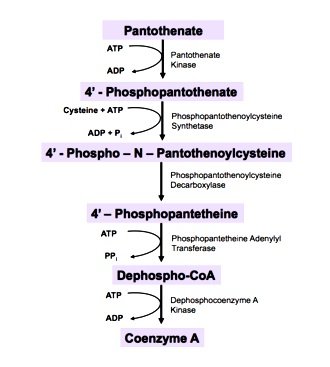Vitamin B5 (Pantothenic Acid): Health Benefits, Sources, Side effects

Vitamin B5 (panothenic acid) plays a key role in breaking down fats, carbohydrates and proteins to provide energy to cells. It is also required for the production of red blood cells, steroids, neurotransmitters and stress-related hormones. It helps maintain a healthy digestive tract and optimal use of vitamin B2.
What is Vitamin B5 (Pantothenic Acid)
Pantothenic acid, otherwise known as vitamin B5, along with other B vitamins, is essential for normal metabolism and the creation of new blood cells. It is a water-soluble vitamin known as pantothenic acid from the Greek word “pantothen” meaning “from everywhere” because this vitamin is available in so many foods.
It helps the body process fats and proteins and is essential to keep the nervous system, skin, hair, eyes and liver in a healthy state.
We also need B5 for the synthesis and metabolism of coenzyme A, which is involved in the synthesis of fatty acids and is important for the conversion of food into fatty acids and cholesterol.
Plus, vitamin B5 reduces daily fatigue and keeps us “on our feet” all day long.
Related: Dr Berg Electrolyte Powder Review
The discovery and importance of vitamin B5
Vitamin B5 was discovered by two scientists, Roger J. Williams and RW Truesdail, in 1931 but was only isolated and successfully studied from 1938 onwards.
Both scientists received the Mead Johnson Award for their discovery and research on this essential vitamin.
In addition to contributing to the production of red blood cells, vitamin B5 helps initiate the process that ensures our bodies receive enough oxygen.
It also helps in the production of hormones released by the adrenal glands, including those that allow the body to cope with stress.
In addition, pantothenic acid is critical for maintaining a healthy digestive system and is required for the synthesis of Co-enzyme-A (CoA), an enzyme that initiates hundreds of metabolic processes in the body, including the breakdown of macronutrients.
The conversion of pantothenic acid to CoA occurs in 5 steps, and requires the enzyme pantothenic kinase, 4 ATP molecules and cysteine.

At the same time, it supports the body’s ability to synthesize cholesterol. A specific form of pantothenic acid (pantethine) can lower cholesterol levels.
As with other forms of vitamin B, pantothenic acid is not stored in the body because it is water-soluble. Most of it is excreted in the urine, which means that we have to get it from food every day.
Metabolism
Absorption of pantothenic acid takes place in the small intestine. Pantothenic acid is found in all tissues in the form of coenzyme A but in higher amounts in the liver, adrenal glands, heart and kidneys.
About 70% is excreted in the urine and 30% in the faeces. The bioavailability of pantothenic acid can be reduced by certain drugs, as well as by high fat intake. In contrast, it can be increased by a diet rich in protein. Pantothenic acid deficiency has not been found in people following a balanced diet.
Related: 15 Best Foods for Viral Infections: Boost Immunity and Fight Off Illness
The Best Vitamin B5 Dietary Sources
Pantothenic acid is sensitive to heat and moisture, so processed foods that have undergone high-temperature production methods may not be enough to replenish the level of the vitamin in the body.
Fortunately, vitamin B5 can be obtained from a wide variety of fresh animal and plant foods such as:
- Meat and dairy products: Beef, duck, chicken, eggs, plain yogurt, liver and kidneys
- Mushrooms: especially shiitake and cremini
- Vegetables: Cauliflower, pumpkin, roast potato, corn, sweet potato, broccoli, kale, turnips, cucumbers, chestnuts and chard
- Seafood: Lobster, shellfish and wild Alaskan salmon
- Fruits: Avocados, strawberries, oranges, and grapefruit
- Sunflower seeds and nuts – A perfect way to have a healthy snack, feel full and energized, and meet your vitamin B5 needs is to eat a small portion of mixed nuts – uncooked and unsalted, of course. In addition, try adding sunflower seeds to various foods.
How Much vitamin B5 do we need daily?
The European Food Safety Authority (EFSA) has set an adequate intake for adults at five milligrams per day (this also applies to pregnant women).
For those who are breastfeeding, seven milligrams per day is recommended to compensate for losses in breast milk. For infants over six months of age, three milligrams per day is recommended.
For children and adolescents, four and five milligrams per day, respectively.
| Age | UK RDA |
|---|---|
| 0-6 months | 1,7 mg |
| 7-12 months | 1,7 mg |
| 1-3 years | 1,7 mg |
| 4-10 years | 3-7 mg |
| 11-50+ years | 3-7 mg |
Vitamin B5 Health Benefits
- Healthy Digestive Track – Vitamin B5 helps maintain a Healthy digestive tract
- Cholesterol – Vitamin B5 can lower cholesterol levels and lower triglycerides. It is also responsible for the metabolism of fatty acids and the synthesis of Cholesterol and phospholipids in the cell membranes.
- Healthier and clearer skin. Can also help promote wound healing, relieve facial acne, and reduce acne-related skin problems
- Improved hair health. It plays a role in nourishing hair follicles, helping to ensure proper hair growth and reduce hair loss.
- Reduced symptoms of rheumatoid arthritis. This disease is associated with a deficiency of pantothenic acid. Studies show that supplementation with vitamin B5 can help alleviate the symptoms of this autoimmune disorder.
- Eye Health – In addition to the benefits mentioned above, pantothenic acid may also help maintain good eye health, proper liver function and a healthy nervous system.
- Energy Production – Vitamin B5 is responsible for producing energy from food (the catabolism of Carbohydrates, Proteins and Fats).
- Synthesizes other nutrients and macronutrients – Vitamin B5 is responsible for the synthesis of Steroid Hormones (Cortisol, Aldosterone and Androgens, Estrogens, Progesterone), for the synthesis of Melatonin, Vitamin A, Vitamin D, for the synthesis of Acetylcholine (neurotransmitter) and Haem (component of Haemoglobin).
- Gene Activation – Pantothenic Acid is responsible for the activation of genes through the acetylation of histones etc.
- Metabolizes drugs and toxins – Pantothenic Acid is also responsible for the metabolism of drugs and toxins by the liver.
Vitamin B5 Deficiency
While a deficiency of vitamin B5 is rare, it is nevertheless possible and some of the signs of deficiency are
- fatigue,
- insomnia,
- depression,
- irritability,
- vomiting,
- abdominal pain,
- burning sensation in the legs and
- upper respiratory infections.
Who is at risk for Pantothenic Acid Deficiency?
At risk for Pantothenic Acid deficiency are those who have a mutation in the PANK II gene, which creates the enzyme Pantothenic Kinase 2. (This is necessary for the conversion of Pantothenic Acid to Coenzyme A or CoA).
The gene mutation is rare and causes the neuro-degenerative condition associated with pantothenate kinase deficiency (pantothenate kinase-associated neurodegeneration or PKAN).
PKAN causes iron accumulation in the brain, dystonia and atrophic retinopathy.
Another case of Pantothenic Acid deficiency is severe malnutrition.
Pantothenic acid antagonists such as Calcium homopantothenate (or Hopantenate) used in some countries for Alzheimer’s disease, can cause Pantothenic acid deficiency.
Related: How To Repair Your DNA Naturally – Consume These Vitamin Packed Foods
Vitamin B5 Side Effects
An overdose of vitamin B5 can increase the risk of side effects such as diarrhoea. It is not recommended that people with haemophilia take vitamin B5 as it may take longer for bleeding to stop.
Vitamin B5 is a water-soluble vitamin, which means that any excess vitamin is excreted in the urine. However, it is not impossible to overdose on vitamin B5.
Excessive intake of vitamin B5 can lead to diarrhea, heartburn, nausea, dehydration, swelling, joint pain, calcification in blood vessels, or depression
Vitamin B5 Supplements
Pantothenic acid and calcium pantothenate are available in tablets and capsules, but are mainly found in multivitamin and mineral preparations. The dose has not been established. Supplements may contain 100mg daily.
Below are some of the best Pantothenic Acid Supplements with the highest ratings.
Final Take
Pantothenic acid is a water-soluble B vitamin and is a component of coenzyme A and acyl transfer protein. Coenzyme A has a central role as a cofactor of enzymes involved in the metabolism of lipids, carbohydrates and proteins. It is also required for the synthesis of cholesterol, steroid hormones, acetylcholine and porphyrins.
Talk to your doctor before taking vitamin B5, especially if you are taking tetracycline – all B vitamins interfere with the absorption and effectiveness of this antibiotic – or medicines to treat Alzheimer’s disease – specifically donepezil, memantine, galantamine and rivastigmine.
